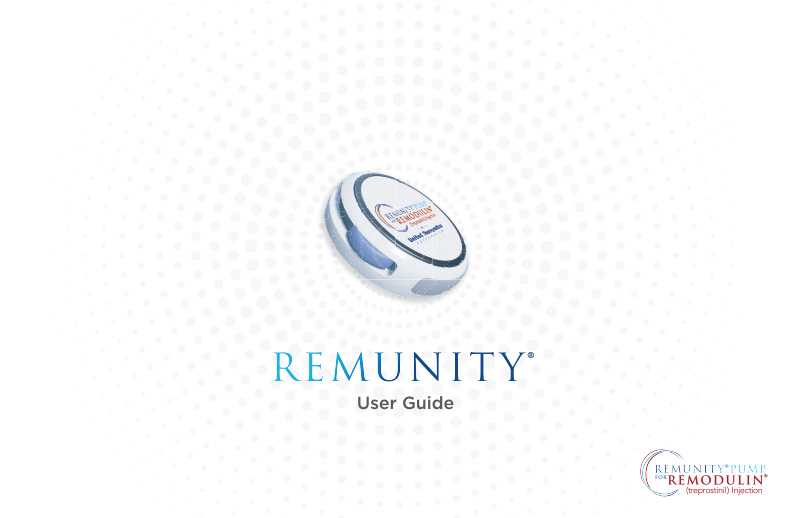You are using a browser that is not supported by this site. The site will not function properly. Please switch to the latest version of a supported browser such as Chrome, Safari, Edge, or Firefox to use this site.

RESOURCES & SUPPORT
MyRemodulin.com: Personalized Support & Inspiration
You've started therapy. You have questions. But you're spending too much time sorting through stacks of information that may or may not have exactly what you need.
MyRemodulin.com is different. Simply answer a few questions about your Remodulin therapy, and you'll get access to personalized information, tailored to your route of administration, your pump, and your journey.
Talk to your doctor about signing up for MyRemodulin.com!
Connecting with Remodulin
Welcome to the Remodulin Social Community
The Remodulin Facebook page provides access to a range of informative videos, educational resources, and support from others, like you, who are impacted by PAH.
The Remodulin Instagram page is a welcoming social space for people living with PAH. You'll find informative videos, patient stories, and helpful advice.
The Remodulin YouTube page offers a series of helpful videos and playlists as it relates to PAH and Remodulin, including life hacks, patient perspectives, and more.
Join the Remodulin Support Program
If you’re thinking about starting Remodulin—or you’re already taking it—United Therapeutics has created a program just for you.
Sign up to receive tips for living with PAH and Remodulin treatment, opportunities to engage with peers, insights from HCPs and patients, resources for productive discussions with your healthcare team, and more.
Join UsWatch helpful videos.
Learn about Remodulin, get patient perspectives, and more.
Downloads & Tools

Remodulin Patient Brochure
Learn more about taking the next step with Remodulin, pump options, and more.
Download
Remunity® User Guide
Learn how to use your Remunity pump, including first-time setup and step-by-step instructions for cassette changes.
Download
Help With Managing Side Effects
Being prepared can help you manage side effects. Review this brochure to help you plan ahead.
Download
Get to know Remunity.
Watch training videos and get to know more about the features of Remunity.
Remodulin® (treprostinil) Injection
Important Safety Information for Remodulin
Before you take Remodulin, tell your healthcare provider if you:
- Have other medical conditions or take other medicines that may affect your use of Remodulin by increasing the risk of side effects or decreasing the drug’s effectiveness.
- Have liver or kidney problems. Your Remodulin dose may need to be adjusted if you have liver problems.
- Have low blood pressure or bleeding problems.
- Are taking gemfibrozil (for high cholesterol), rifampin (for infection) or other drugs that affect liver enzymes. Your doctor may need to adjust your Remodulin dosage.
- Are pregnant, breastfeeding, or planning to become pregnant. It is not known if Remodulin will harm your unborn baby or if Remodulin passes into your breast milk.
What are the serious side effects of Remodulin?
- Continuous intravenous (IV) infusions of Remodulin delivered using an external infusion pump, with a tube placed in a central vein within the chest, are associated with the risk of blood stream infections and sepsis, which may be fatal. Therefore, continuous subcutaneous (SC) infusion delivered just beneath the skin is the preferred type of delivery.
- Worsening of PAH symptoms. Do not stop taking or greatly reduce your Remodulin dose without consulting your doctor.
- Low blood pressure (symptomatic hypotension). If you have low blood pressure or are taking drugs that lower your blood pressure, the risk of low blood pressure is increased.
- Bleeding problems. Remodulin may increase the risk of bleeding in people who take blood thinners (anticoagulants).
What are the possible side effects of Remodulin?
- In clinical studies of SC infusion of Remodulin, most people experienced infusion site pain and infusion site reaction (redness, swelling, and rash). These symptoms were sometimes severe and sometimes required treatment with narcotics or discontinuation of Remodulin.
- IV infusion of Remodulin delivered through an external pump has been associated with the risk of blood stream infections, arm swelling, tingling sensations, bruising, and pain.
- The most common side effects seen with either SC or IV Remodulin were headache, diarrhea, nausea, rash, jaw pain, widening of the blood vessels (vasodilatation), and swelling from fluid retention (edema). These are not all the possible side effects of Remodulin. Call your doctor for medical advice about side effects.
You may report side effects to the FDA at www.fda.gov/MedWatch or call 1-800-FDA-1088.
You may report side effects to the FDA at www.fda.gov/MedWatch or call 1-800-FDA-1088.
The risk information provided here is not comprehensive.
What is Remodulin?
Remodulin is a prescription medication used to treat adults with pulmonary arterial hypertension (PAH; WHO Group 1), which is high blood pressure in the arteries of your lungs. Remodulin can reduce symptoms associated with exercise. Remodulin was studied mainly in patients with NYHA Functional Class II-IV symptoms. It is not known if Remodulin is safe and effective in children.
In people with PAH who need to switch from epoprostenol, Remodulin is approved to slow the worsening of symptoms.
REMISIconMAY2021
To learn more about Remodulin, talk with your healthcare provider. Please see Full Prescribing Information at www.remodulin.com or call Customer Service at 1-877-UNITHER (1-877-864-8437).
To learn more about Remodulin, talk with your healthcare provider. Please see Full Prescribing Information at www.remodulin.com or call Customer Service at 1-877-UNITHER (1-877-864-8437).
PAH=pulmonary arterial hypertension; WHO=World Health Organization.
Remodulin® (treprostinil) Injection
Important Safety Information for Remodulin
Before you take Remodulin, tell your healthcare provider if you:
- Have other medical conditions or take other medicines that may affect your use of Remodulin by increasing the risk of side effects or decreasing the drug’s effectiveness.
- Have liver or kidney problems. Your Remodulin dose may need to be adjusted if you have liver problems.
- Have low blood pressure or bleeding problems.
- Are taking gemfibrozil (for high cholesterol), rifampin (for infection) or other drugs that affect liver enzymes. Your doctor may need to adjust your Remodulin dosage.
- Are pregnant, breastfeeding, or planning to become pregnant. It is not known if Remodulin will harm your unborn baby or if Remodulin passes into your breast milk.
What are the serious side effects of Remodulin?
- Continuous intravenous (IV) infusions of Remodulin delivered using an external infusion pump, with a tube placed in a central vein within the chest, are associated with the risk of blood stream infections and sepsis, which may be fatal. Therefore, continuous subcutaneous (SC) infusion delivered just beneath the skin is the preferred type of delivery.
- Worsening of PAH symptoms. Do not stop taking or greatly reduce your Remodulin dose without consulting your doctor.
- Low blood pressure (symptomatic hypotension). If you have low blood pressure or are taking drugs that lower your blood pressure, the risk of low blood pressure is increased.
- Bleeding problems. Remodulin may increase the risk of bleeding in people who take blood thinners (anticoagulants).
What are the possible side effects of Remodulin?
- In clinical studies of SC infusion of Remodulin, most people experienced infusion site pain and infusion site reaction (redness, swelling, and rash). These symptoms were sometimes severe and sometimes required treatment with narcotics or discontinuation of Remodulin.
- IV infusion of Remodulin delivered through an external pump has been associated with the risk of blood stream infections, arm swelling, tingling sensations, bruising, and pain.
- The most common side effects seen with either SC or IV Remodulin were headache, diarrhea, nausea, rash, jaw pain, widening of the blood vessels (vasodilatation), and swelling from fluid retention (edema). These are not all the possible side effects of Remodulin. Call your doctor for medical advice about side effects.
You may report side effects to the FDA at www.fda.gov/MedWatch or call 1-800-FDA-1088.
The risk information provided here is not comprehensive.
What is Remodulin?
Remodulin is a prescription medication used to treat adults with pulmonary arterial hypertension (PAH; WHO Group 1), which is high blood pressure in the arteries of your lungs. Remodulin can reduce symptoms associated with exercise. Remodulin was studied mainly in patients with NYHA Functional Class II-IV symptoms. It is not known if Remodulin is safe and effective in children.
In people with PAH who need to switch from epoprostenol, Remodulin is approved to slow the worsening of symptoms.
REMISIconMAY2021
To learn more about Remodulin, talk with your healthcare provider. Please see Full Prescribing Information at www.remodulin.com or call Customer Service at 1-877-UNITHER (1-877-864-8437).
PAH=pulmonary arterial hypertension; WHO=World Health Organization.